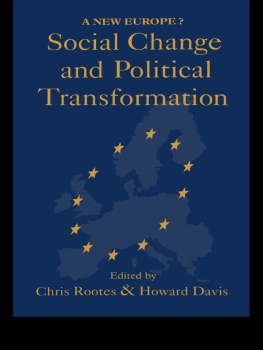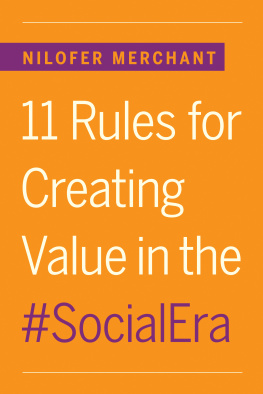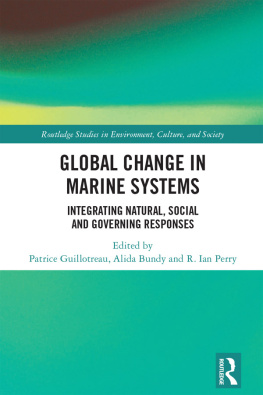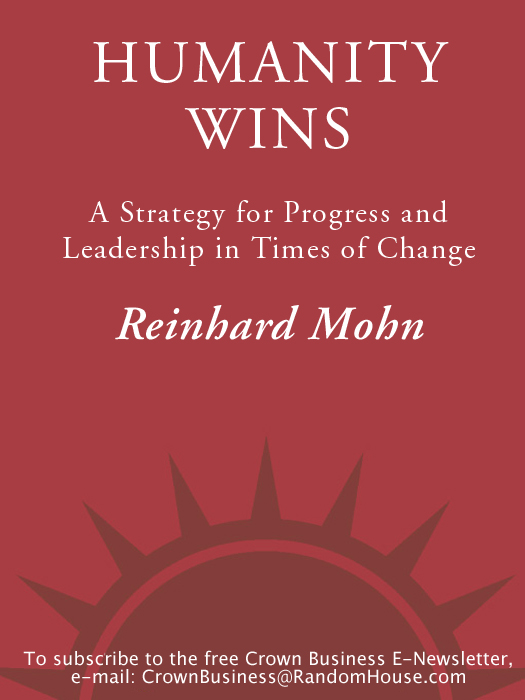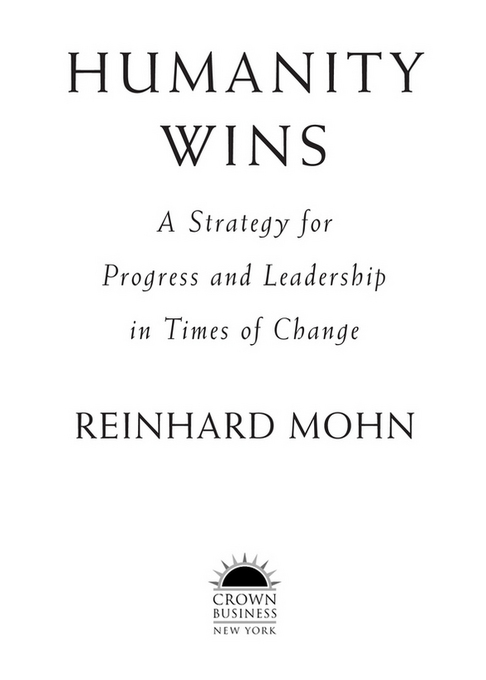Translation copyright 2000 by Bertelsmann Foundation Publishers
All rights reserved. No part of this book may be reproduced or transmitted in any form or by any means, electronic or mechanical, including photocopying, recording, or by any information storage and retrieval system, without permission in writing from the publisher.
Published by Crown Business, New York, New York. Member of the
Crown Publishing Group.
Random House, Inc. New York, Toronto, London, Sydney, Auckland
www.randomhouse.com
Crown Business and colophon
are registered trademarks of Random House, Inc.
Originally published in German as Menschlichkeit gewinnt by
Bertelsmann Foundation Publishers in 2000.
Library of Congress Cataloging-in-Publication Data
Mohn, Reinhard, 1921
Humanity wins : a strategy for progress and leadership in times of change / Reinhard Mohn.
1. Social history1970 2. Social institutions. 3. Social change.
4. CapitalismSocial aspects. I. Title.
HN17.5 .M653 2000
306dc21
00-027962
eISBN: 978-0-307-81447-0
v3.1
To my wife and partner, Liz, who helped me to find my way, in gratitude.
Contents
Foreword
Entrepreneurs must seek more than just profits in shaping their corporate strategy. As creators of prosperity, they must also consider the effect of their work on society, culture, and the environment. As such, a paradigm shift toward a values-oriented corporate ethic will soon be as indispensable to success as thinking in a future-oriented global context is now.
Nowadays it should be evident that a companys success is significantly influenced by how it activates its human capital. From experience, however, we know how difficult it is to realize such goals in corporate practice. With his entrepreneurial maxim humanity and his highly successful corporate personality, Reinhard Mohn has come up with a convincing response to this paramount challenge.
But Reinhard Mohn does not emphasize only entrepreneurial market success. Rather, he has always been conscious of the responsibility of entrepreneurs to act for the public good. On the one hand, companies rely on ordered and stable social and political conditions for their success; on the other hand, they must be conscious of the responsibility resulting from their dynamic role in shaping society and politics.
Globalization of the marketplace is not only dramatically changing existing economic structures in a process of creative destruction; it is also creating a great deal of risk and insecurity for employment, social stability, and the environment. Above all, however, globalization presents a challenge to our established policies and political institutions, which are still largely anchored within the framework of the nation-state. Political institutions have reached the limits of their performance capacity. In their reluctance to change, they are becoming less and less able to cope effectively with the challenges of shaping the future. Politics has lost its orientation, and trust in its ideas and concepts has been lost as well.
The sustainability of politics is a crucial challenge to leaders in the political, social, scientific, and academic spheres. It is also the focus of our intellectual pursuits at the Club of Rome. For years, Reinhard Mohn has examined this topic in depth with his Bertelsmann Foundation, with a wide variety of studies and proposals for a creative revitalization of politics.
Future-oriented economic and social activism is a challenging undertaking. In trying to live up to that challenge, the Bertelsmann Foundation and the Club of Rome have worked together on numerous projects, and their cooperation has been beneficial to all participants.
Reinhard Mohns philosophy on revitalizing politics is founded in his experiences with the creative potential of people employed by companies. It is his convictionand this has been proved in practice in many Bertelsmann Foundation projectsthat performance incentives can successfully mobilize these individual forces to take responsibility for the benefit of the community.
With this book, originally a report to the Club of Rome, Reinhard Mohn shares his wealth of entrepreneurial experience to point out practicable paths toward a civil society committed to individual responsibility that will benefit the community, thus providing politics with a new and expanded sphere of action. With the persuasive power of personal conviction, Reinhard Mohns report is primarily addressed to those willing to take action in and for a civil society. May Reinhard Mohns message find many readers and coconspirators!
The Club of Rome, with its one hundred members from more than fifty countries around the globe, sees itself as a catalyst for change and as a center for innovation and initiative. For these reasons, the Club of Rome welcomes this book as an important contribution to public discourse about one of the most important issues of our eraalthough not all of its members are in complete agreement with the content. Views and opinions reflect the experiences of the author. It is hoped that a debate within the framework of the Club of Rome will intensify the global dimension of these reflections.
Ricardo Dez-Hochleitner, president, and
Uwe Mller, secretary general, for the members of the
Executive Committee of the Club of Rome
Preface
In a time when the only constant is constant changethanks to an ever-growing, nonstop global information networkanyone who attempts to understand current international developments and to venture predictions can easily become overwhelmed and discouraged by news reports that focus on conflicts and failure, while vital communication regarding common interests and differences of opinion becomes increasingly rare and difficult to sustain without great effort. Years ago, the Club of Rome discussed whether we will ever achieve global governability. Since then, many ideas have been tried and new institutions have been developed to coordinate those efforts. Despite increasing interest in the question of leadership capacity, little progress has been made.
Why is this so? Globalization has left its mark on virtually every culture and social order. Processes that evolved over the ages are now called into question in an instant. What has not changed is human nature. It is as difficult for people to comprehend these changes and to accept political and economic responsibility for dealing with them.
But do we really have a choice? Can we distance ourselves from globalization? If we choose to ignore the challenge of globalization, are we prepared to bear the consequences of a lower standard of living? World leaders and citizens alike will face and be affected by these uncertainties. We know that the systems handed down to usfor example, democracy and the market economymust be reconceived and improved if they are to survive in the international arena. We must begin by realizing that old rules no longer apply. In this process of dramatic global change, however, we must ensure that humanity is not lost, that the values and principles we cherish are not undermined.
In this book I will attempt to demonstrate new goals and principles for updating the democratic constitutional order of our system of governance. Some of my proposals are based on innovative, tested concepts. Others are simply drafts of models that take into consideration current societal conditions. I am aware that Ive taken a specific standpoint based on my personal experience. I also understand that these models represent only one part of the massive reform task that lies ahead. By qualifying my endeavor in this way, though, I do not intend to question the central aim of this book, which is to demonstrate the need for an extensive reform of our economic and social systems. All modern cultures must set new goals, renew leadership structures, and test systems of governance. These provide the very foundation of future cooperation, security, and peace in our world.


